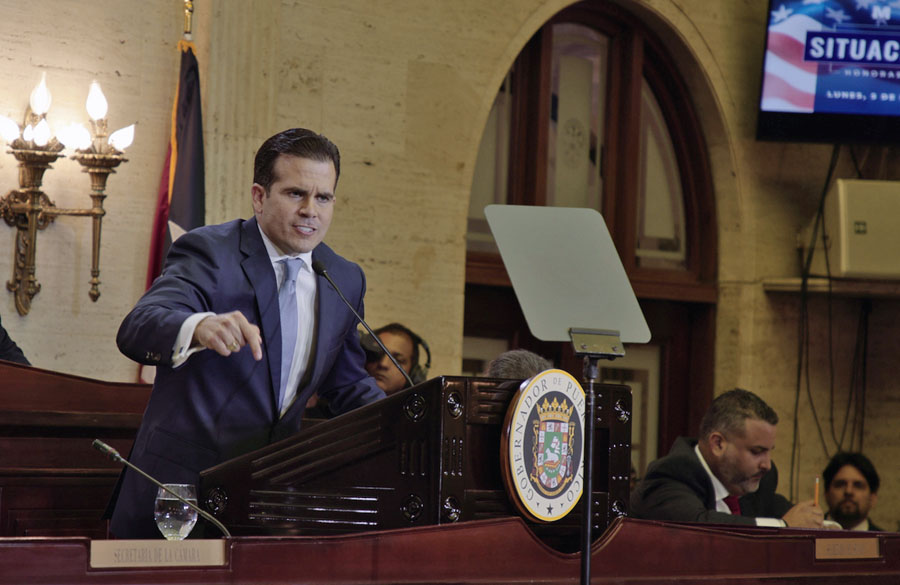Center for Investigative Journalism concludes Rosselló’s tax promises ‘deceptive’

By Angélica Serrano-Román
Center for Investigative Journalism
Puerto Rico Gov. Ricardo Rosselló, closed 2018 with a message saying his administration is promoting economic development by reducing taxes “instead of putting our hand in your pockets.”
“As part of a new public policy, we reduce [sic] tax rates to corporations and grant a five percent credit to individuals,” he said.
While it is true that by 2019 taxes were reduced from 20 percent to 18.5 percent, according to the 2018 Tax Reform, the percentages for the allowed deductions for food, entertainment, travel and lodging expenses were also reduced by half, an analysis by the Center for Investigative Journalism concluded.
The law that establishes Rosselló’s tax reform states that corporate taxpayers who could claim 50 percent for food and entertainment expenses, now can only deduct 25 percent.
As for business trips and lodging, for which they could claim 100 percent, now can only be deducted by 50 percent. Only 25 percent of meals or entertainment expenses during the trip may be claimed.
For example, if a clothing store had a gross income of $25,000 and its travel expenses to buy items totaled $10,000, it could deduct the $10,000 and the taxes would be paid at a rate of 20 percent of the $15,000. Therefore, the tax payment would have been $3,000.
Now, under the new reform, the corporate taxpayer can only deduct $5,000 of the $10,000 in travel expenses. The payment now will be at a rate of 18.5 percent of the $20,000, that is $3,700.
This means that there is no real savings because, although the tax rate decreased 1.5 percent, the deductible expenses allowed were also reduced. The sample company, with the same income and expenses, now pays more because only half of the travel expenses are deducted.
CPA and specialist in taxes and tax law, Edil Sánchez-González said the reform provides relief in corporate rates but admitted the law benefits only a group of corporations.
“Yes. there are certain cases [that are harmed by the reform.] When there is a reform there are always winners and there are always losers,” said Sánchez-González, who was part of the Puerto Rico Tax Reform Commission.
Corporations that are not favored by the law have other alternatives, among which he mentioned the optional tax (paying taxes and not paying expenses) or a certification issued by a CPA claiming expenses. The latter implies an additional expense for corporations.
When asked if these options would mean that corporate taxpayers would incur in more processes, the accountant replied that “at the moment, the Treasury Department has not issued a regulation or has made a statement as to what it will require for these corporations.”
Treasury will establish whether the processes will be simple or not, he said.
“They are supposed to validate it [the regulation] with the Association of Certified Public Accountants,” he added, mentioning that the reason why the regulation is not yet issued is because it will go out at the time of the filing of the 2020 tax forms.
On the other hand, CPA Nancy Arizmendi-Morales, certified in the tax reform by audit and tax advisory firm Kevane Grant Thornton, said the law benefits some corporations, but not the majority.
“The least benefited will be small industries, retail corporations, advisory firms, among others,” she said.
“I do not consider it a relief. [The tax reform] was only to unify processes and audit. At the same time, it discourages payments under the table,” said Arizmendi-Morales.
Sánchez-González agreed on the monitoring role that the government will assume with the reform.
“If you are a tax evader, who does not report because you do not want to pay, you will have to report. That group will be affected,” he said.
Limited credit to individuals
On the other hand, in his message, Rosselló mentioned a 5 percent credit for individuals. There are two 5 percent credits in the law.
The 5 percent credit for work, which does not apply to everyone, since it is limited according to the number of dependents, marital status and income. The other 5 percent credit, which the governor referred to, applies only to those who have a determined tax obligation.
“There was a reduction in corporate tax rates, but in the case of individuals it stayed the same and a credit was granted on their determined contribution,” said Sánchez-González.
In the case of work credit, for example, an individual taxpayer without dependents qualifies only if their income is between $18,000 and $20,500 a year.
The reform reduces the exemption for people who receive income from professional services from $1,500 to $500 and increases the retention from 7 percent to 10 percent.
According to Arizmendi-Morales, it is expected that most of the individuals will find out about the changes when filing their forms. He said Treasury’s lack of monitoring “is being paid for by accountants and taxpayers.”
Rosselló’s statement is misleading because, although taxes dropped by 1.5 percent, there was also a decrease in the percentages of deductible expenses corporations must pay, even if they have losses, and credit to individuals is limited.
According to the methodology used by the Center for Investigative Journalism, which is based on the experience of Chequeado.com, a statement is misleading when the information may coincide with certain data but, intentionally or not, it has been manipulated to generate a particular message.












